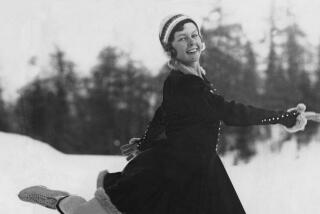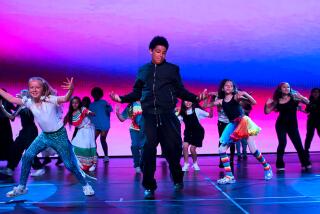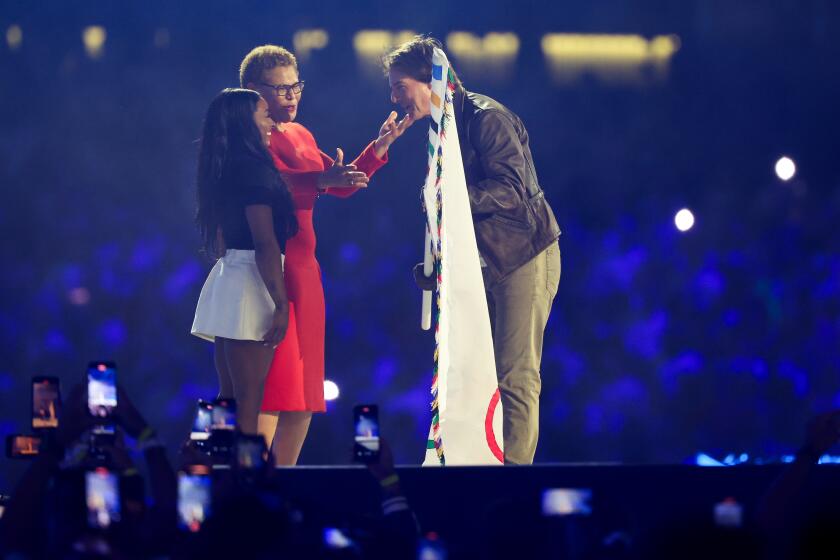Just for Her
We’ll think we are hearing her music. We aren’t.
When Angela Nikodinov takes to the ice at the U.S. Figure Skating Championships this week, the loudspeakers will blare classical, but her mind will play oldies.
Cackling from a car radio. Driving from Lake Arrowhead to San Pedro. Sung loud and off-key and absolutely perfectly by her best friend and coach, Elena Tcherkasskaia.
“She would know all the words, even if they didn’t sound like all the words,” recalled Nikodinov. “She would grab my hand and say, ‘We sing, Muska, we sing.’”
We’ll think she is hearing our cheers. She’s not.
Amid thousands of voices filling Staples Center for the local girl who learned to skate at a mall, Nikodinov will hear only one.
The only voice that ever convinced her that she was strong. The only voice that made her believe she was beautiful.
A voice that she can now only recognize when she closes her eyes.
“She would call me ‘My little angel,’” Nikodinov recalled. “Nobody has ever called me that before.”
We’ll think we understand her grace. We won’t have a clue.
For even the most unburdened athletes, it will be difficult enough this week to execute precise moves under monster pressure.
Now try that triple lutz with grief laced to your skates.
Angela Nikodinov, 21, who finished third in last year’s nationals and fifth in the worlds, will contend for one of the top three Olympic berths in women’s singles.
But she will do so while hauntingly skating pairs with Elena Tcherkasskaia, her coach who died in Moscow on Nov. 12 of pancreatic cancer.
“It’s like I still don’t believe it,” Nikodinov said. “Like, to me, it’s still not real.”
Of course not.
Because Nikodinov was never told Tcherkasskaia was gravely ill.
Even Tcherkasskaia was never told.
They both thought the 64-year-old coach was being treated for a hernia or a blood disorder.
Leonid Tcherkasskaia thought it would be easier for his wife and her pupil if they didn’t know.
Two months and several desultory competitions later, Nikodinov thinks, this is easier?
“I know I should realize this has happened,” she said during a recent interview at the HealthSouth training center in El Segundo. “But I still can’t.”
Nikodinov never imagined that, on Sept. 29, when Tcherkasskaia boarded a plane for Moscow for treatment of this supposedly unknown illness, it would be the last time she would see her.
She remembers waving as the car left her San Pedro driveway for the airport.
Said the coach, “Goodbye, my little angel.”
Recalled Nikodinov, “If I had known what was happening, I would have locked her in my room, not let anybody take her anywhere.”
Six weeks later, Nikodinov remembers being given the news in a hotel in Germany, shortly before she’d thought she and Tcherkasskaia would be meeting at a competition.
It came from her father in a 7 a.m. phone call. He was crying. She couldn’t understand.
“I thought, ‘She’s dead? How can she be dead!’” Nikodinov recalled. “I slammed down the phone. I couldn’t breathe.”
She was so surprised and upset, she began throwing things against a wall. Then she ran outside to a balcony. One team official was fearful she would leap.
She couldn’t bear to attend the open-casket funeral. For four days, she couldn’t bear to leave her bed. For one of the most important months of training, she couldn’t bear to hire a new coach.
She still has a photo of Tcherkasskaia on the computer screen saver in her San Pedro bedroom. She still has her photos of the two of them on her car’s visor.
It’s now about goodbye.
To the woman who, she says, changed her life, she never said goodbye.
Before she can skate forward toward an Olympic podium that once seemed her destiny, she needs that goodbye.
This week, with everybody watching and nobody understanding, she will try again.
There was a memorial service, a couple of days before Christmas, in a Lake Arrowhead lodge near the home owned by Elena Tcherkasskaia and Angela Nikodinov.
It was Nikodinov’s first chance to address her loss.
The setting was perfect.
Several top skaters were there, including Timothy Goebel and Michelle Kwan.
Other teachers and friends were there, in tribute to the former Bolshoi ballerina who touched so many skaters with her choreography.
Someone read a letter from former pupil Nicole Bobek.
Someone else read a poem.
There was a video. There was a prayer.
Nikodinov watched it all from a fourth-row seat between Goebel and new Coach Frank Carroll.
“Anyone else want to say anything?” asked the Rev. Randy Buechler.
Nikodinov shuffled her legs. She hid her face. She couldn’t move.
“I said to myself, ‘Get up!’ But I couldn’t get up,” she said. “I said it again. ‘Get up!’ But I couldn’t get up.”
So it has been with her skating since Tcherkasskaia’s death.
She has started each competition strong, then faded.
She finished third in three events, but did not qualify for the prestigious Grand Prix Final, matching the best six female skaters in the world.
“When Elena was standing over there, I could feel her energy and her power,” Nikodinov said. “Without her, I felt naked.”
Last month she hired the famed Carroll to help her find her balance.
Recently spurned by longtime pupil Michelle Kwan, Carroll understands something about loss.
“I am not a miracle worker,” he said. “I can only tell Angela, ‘Put all those emotions in a fist and take them to a trash can and put them in the can.’”
He sighed.
“Those are easy words to say, but very difficult to do.”
Especially when you are skating a long program to “Giselle” ... and your late teacher once was Giselle.
They began working together at Lake Arrowhead in the summer of 2000, with an atypically casual beginning for a relationship so special.
There was no contract. No handshake. No promises.
Nikodinov had just left Coach Richard Callaghan because, she says, she didn’t like living in Detroit, his home base. She was, by most accounts, a great athlete without great flair.
Tcherkasskaia, a longtime famed choreographer, understood flair.
Nikodinov couldn’t express herself like a dancer.
Tcherkasskaia couldn’t skate.
“We were an amazing team,” Nikodinov said.
Sure enough, by the end of their second year together, Nikodinov had risen from great potential to great resume.
“I’ve never seen such a change,” said Ice Castle publicist Cindy Lang. “Angela didn’t change into a different person. She changed into herself.”
Uncertain moves became confident ones. The athlete became a storyteller.
“She turned her into a lady,” said Nikodinov’s mother, Dolores.
So much that Dolores admits her husband became jealous.
“They would come home to San Pedro and run into Angela’s bedroom giggling about something,” she recalled. “Elena would tell us that she knew all of Angela’s secrets.”
The women traveled together, shopped together, worked together, but mostly laughed together.
“She had no children, so I became her daughter,” Nikodinov said. “The boys would come around and she would say, ‘Five meters! Every boy must stand back five meters!’”
Being the good daughter, in late September Nikodinov prompted Tcherkasskaia to see a doctor.
Tcherkasskaia had spent about a week in bed, exhausted. Her chest burned. Her face, always so bright and expressive under a baseball cap, was dull and lifeless.
Nikodinov practiced at the rink every day in front of an empty chair draped with Tcherkasskaia’s coat. They thought it was only flu.
“Finally, I knew she was too sick, and I ordered her to get into the car,” Nikodinov said. “She didn’t want to go. I made her go.”
They drove through rush-hour traffic from Lake Arrowhead to Torrance for afternoon tests.
That night, at midnight, the phone rang in Nikodinov’s home.
It was a doctor, telling Nikodinov’s father that Tcherkasskaia was very sick. The next call was to Tcherkasskaia’s husband, Leonid, in Moscow.
“Then her husband called us from Moscow and told us it was pancreatic cancer, but that we couldn’t tell either of them about it,” Dolores recalled. “It was very hard. I cried about it. But what could I do? We had to make up a story even to get Elena back to Moscow for treatment.”
Nikodinov and Tcherkasskaia talked every day while she was in a Moscow hospital. The teacher sounded more sedated each day, but kept explaining that she was only having blood work.
“People starting asking me whether she had cancer, and I said, no,” recalled Nikodinov. “That was not even on my mind.”
Then, in an instant, it became her life.
“I know she would want me to get through this, to move forward and succeed,” Nikodinov said. “Sometimes it doesn’t work. But I’m trying.”
While watching Nikodinov skate, Tcherkasskaia used to clutch a little wooden icon in her purse.
Just before skating, Nikodinov would clutch her own icon, a blue stone eye on a necklace that was given to her by her coach.
Tcherkasskaia was buried with her icon.
Nikodinov clutched hers throughout the interview.
“It is an evil eye, given to me to keep away the bad stuff,” she said. “For me now, this is Elena.”
She squeezed it hard, then soft.
“She would say, ‘Muska, you can do this. You can do this.’”
*
Bill Plaschke can be reached at [email protected].
More to Read
Go beyond the scoreboard
Get the latest on L.A.'s teams in the daily Sports Report newsletter.
You may occasionally receive promotional content from the Los Angeles Times.









